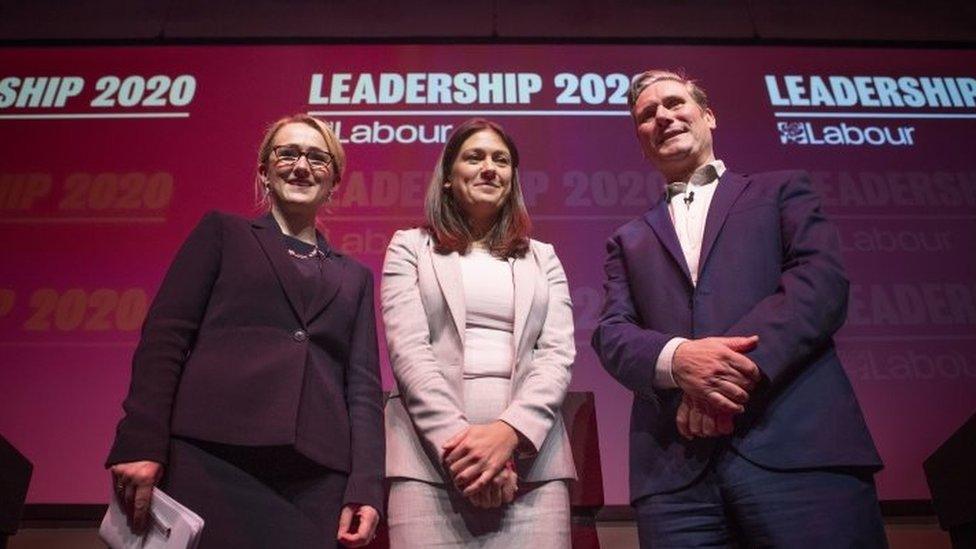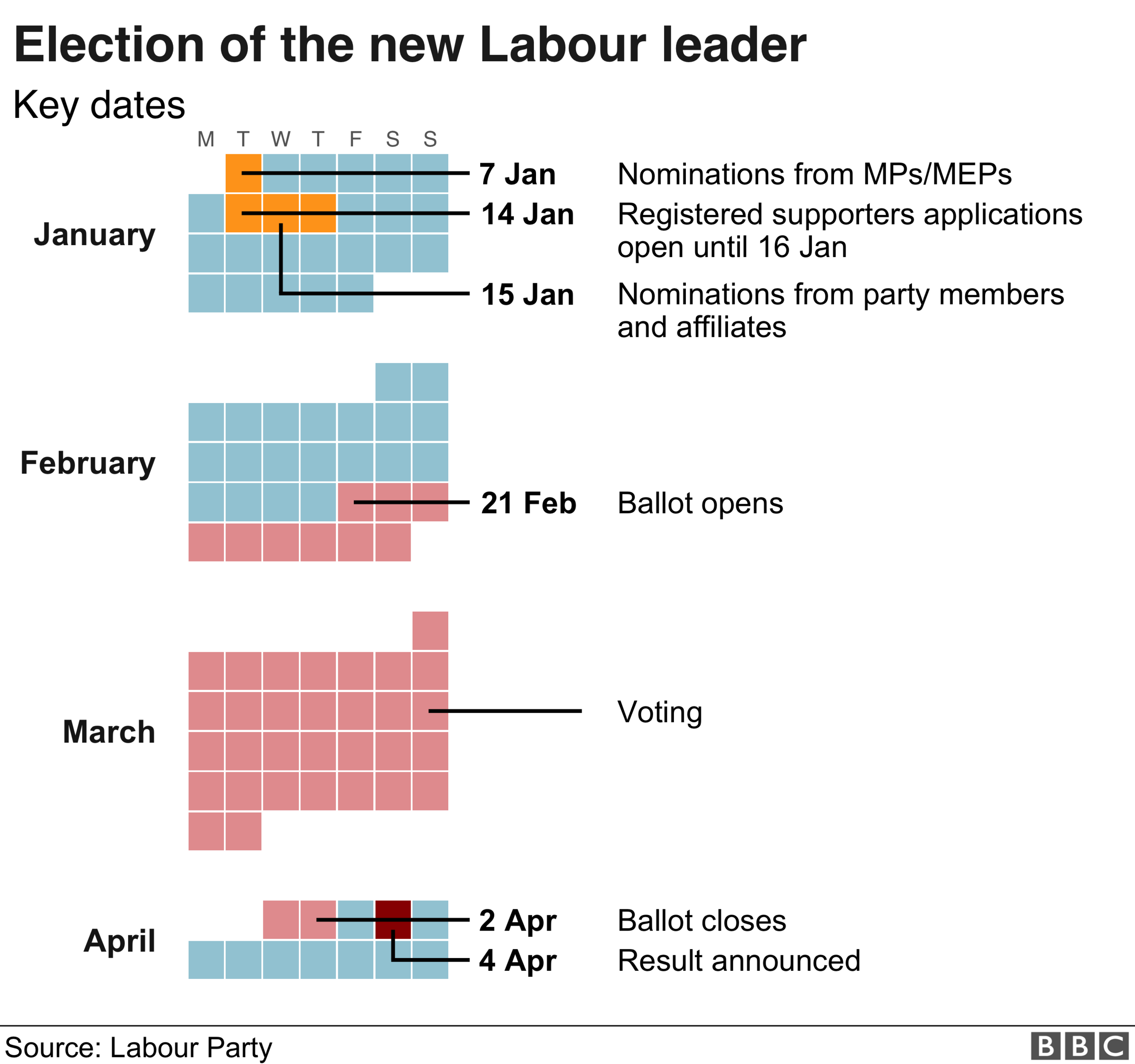Labour leadership: Corbyn's team wanted faction fight, says Lisa Nandy
- Published
Lisa Nandy on Labour's "factional war" under Corbyn
Labour leadership contender Lisa Nandy has spoken out against "faction fighting" under Jeremy Corbyn.
Ms Nandy said she raised her concerns with the Labour leader before she quit his shadow cabinet in 2016.
She said some members of his team "made it very, very clear they were going to continue to wage that factional war until the other side had been crushed".
Allies of Mr Corbyn say it is "nonsense" to suggest he wanted to wage "war" on another part of the party.
Ms Nandy was speaking to the BBC's political editor Laura Kuenssberg.
The Wigan MP joined a mass walkout of so-called "moderate" shadow ministers in 2016, triggered by Labour's poor European election performance and Mr Corbyn's decision to sack Hilary Benn.
She insisted that she had tried, with a group of "soft left" MPs, to hold the team together at a meeting with Mr Corbyn and other senior figures.
But the attitude of those around Mr Corbyn made her decide to quit as shadow energy secretary, she told the BBC's political editor.
"Some senior politicians in his own team, they made it very, very clear that they were going to continue to wage that factional war until the other side had been crushed," she said.
She said it was "one thing" to have backbenchers waging factional wars with colleagues but "quite another thing to hear the leadership of the Labour Party state a commitment to doing that".
She added: "It wasn't Jeremy but there was no point at all at which he contradicted that."
Allies of Mr Corbyn have acknowledged that the meeting did take place just after the referendum in 2016.
But they dispute Ms Nandy's version of events, citing the fact that Mr Corbyn later invited some of those who opposed his leadership back into the shadow Cabinet.
Sources say it is "nonsense" to suggest that Mr Corbyn wanted to wage a "war" on another part of the party, the BBC's political editor says.
Laura Kuenssberg has previously interviewed Ms Nandy's leadership rivals Rebecca Long-Bailey and Sir Keir Starmer. The winner of the contest will be announced on 4 April.


Long known in Labour circles as a straightforward politician and an interesting thinker, she has been the most willing to speak out about the mistakes the party made in recent years.
That's been easier for her as she quit the party's leadership team.
The others have tiptoed around what went wrong, in part because they, as members of the shadow cabinet, were part of the group (at least in theory), that made the errors that led to the defeat and also because they have been afraid to trash Jeremy Corbyn's reputation when many members still believe in him and only a couple of months ago were standing on doorsteps, trying to pitch his message.
In our interview with Lisa Nandy she didn't hold back, not just her analysis of how Labour has drifted away from many communities it used to represent, but also on how both sides of the party went into what she describes as a "factional war"

Ms Nandy co-chaired Owen Smith's unsuccessful attempt to unseat Mr Corbyn as leader, after quitting the shadow cabinet.
But she insisted she was a "non-factional" and "collegiate" politician who had worked with both Blairite and left-wing MPs before being elected to Parliament in 2010.
And she said the internal wars between the party's left and right wings had contributed to Labour's heavy defeat in December's general election.
"We've had four years, not just of infighting within the Labour Party and a factional war, waged from the frontbenches and the backbenches that showed the public we were more interested in ourselves, than we were in them, but we'd also had Brexit which was really, really devastating."
She said most voters had no idea what Labour was proposing at the election because "I don't think people were even listening when we launched the manifesto".
'Public ownership'
But she said she would "ditch anything where we didn't know how we're going to pay for it", from the party's next manifesto, if she is elected leader.
One example of this would be the party's plan to "scrap tuition fees without a plan to pay for it".

Lisa Nandy (centre): I feel like my only friends in the world at the moment are Becky and Keir
She said she was opposed to tuition fees and had worked with trade unions on a plan to introduce a tax on business to "fund free tuition fees for everybody in England and Wales".
"But you can't just go into an election saying that you're going to spend money, because it's their money. And, as one woman said to me in Wigan in 2017: 'It's our money, love, and we haven't got a lot of it'."
She also expressed doubts about Labour's commitment to nationalising six major industries.
"I'd bring them into public ownership but I wouldn't nationalise them all," she told the BBC's political editor.
"I don't see why we would give huge subsidies to the major big six energy companies in order to buy them back into public control. That's simply taking taxpayers' money and handing it over to shareholders."
'Shouting slogans'
Instead, Labour should be "much more radical" and "invest in local councils and local communities being able to set up their own energy companies" to disrupt the market and bring down bills.
"That seems to me a sort of 21st Century socialism that people are really receptive to. But we've got to go out and win the argument," she said.
Asked - like the other contenders interviewed by Laura Kuenssberg - if she had any "Tory friends", she said she "had friends who vote Tory".
She added: "I feel like my only friends in the world at the moment are Becky and Keir. We just go round and round conference centres shouting slogans at each other.
"Occasionally, when I'm not doing this I do get out and go for a pint and have a chat to my actual mates, Tory or otherwise."

